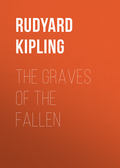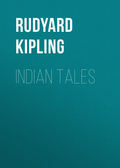
Редьярд Джозеф Киплинг
Rewards and Fairies
‘The wine and the warmth cast the old man into a dream. His white head bowed; his hands hung. His eye indeed was opened, but the mind was shut. When he stretched his feet, they were scurfed and road-cut like a slave’s.
‘“Ah, Rahere,” cried Hugh, “why hast thou shown him thus? Better have let him die than shame him – and me!”
‘“Shame thee?” said the King. “Would any baron of mine kneel to me if I were witless, discrowned, and alone, and Harold had my throne?”
‘“No,” said Rahere. “I am the sole fool that might do it, Brother, unless" – he pointed at De Aquila, whom he had only met that day – "yonder tough Norman crab kept me company. But, Sir Hugh, I did not mean to shame him. He hath been somewhat punished through, maybe, little fault of his own.”
‘“Yet he lied to my Father, the Conqueror,” said the King, and the old man flinched in his sleep.
‘“Maybe,” said Rahere, “but thy Brother Robert, whose throat we purpose soon to slit with our own hands – ”
‘“Hutt!” said the King, laughing. “I’ll keep Robert at my table for a life’s guest when I catch him. Robert means no harm. It is all his cursed barons.”
‘“None the less,” said Rahere, “Robert may say that thou hast not always spoken the stark truth to him about England. I should not hang too many men on that bough, Brother.”
‘“And it is certain,” said Hugh, “that" – he pointed to the old man – "Harold was forced to make his promise to the Great Duke.”
‘“Very strongly forced,” said De Aquila. He had never any pride in the Duke William’s dealings with Harold before Hastings. Yet, as he said, one cannot build a house all of straight sticks.
‘“No matter how he was forced,” said Henry, “England was promised to my Father William by Edward the Confessor. Is it not so?” William of Exeter nodded. “Harold confirmed that promise to my Father on the bones of the Saints. Afterwards he broke his oath and would have taken England by the strong hand.”
‘“Oh! La! La!” Rahere rolled up his eyes like a girl. “That ever England should be taken by the strong hand!”
‘Seeing that Red William and Henry after him had each in just that fashion snatched England from Robert of Normandy, we others knew not where to look; but De Aquila saved us quickly.
‘“Promise kept or promise broken,” he said, “Harold came near enough to breaking us Normans at Senlac.”
‘“Was it so close a fight, then?” said Henry.
‘“A hair would have turned it either way,” De Aquila answered. “His house-carles stood like rocks against rain. Where wast thou, Hugh, in it?”
‘“Among Godwin’s folk beneath the Golden Dragon till your front gave back, and we broke our ranks to follow,” said Hugh.
‘“But I bade you stand! I bade you stand! I knew it was all a deceit!" Harold had waked, and leaned forward as one crying from the grave.
‘“Ah, now we see how the traitor himself was betrayed!” said William of Exeter, and looked for a smile from the King.’
‘“I made thee Bishop to preach at my bidding,” said Henry; and turning to Harold, “Tell us here how thy people fought us?” said he. “Their sons serve me now against my Brother Robert!”
‘The old man shook his head cunningly. “Na – Na – Na,” he cried. “I know better. Every time I tell my tale men stone me. But, Thanes, I will tell you a greater thing. Listen!” He told us how many paces it was from some Saxon Saint’s shrine to another shrine, and how many more back to the Abbey of the Battle.
‘“Ay,” said he. “I have trodden it too often to be out even ten paces. I move very swiftly. Harold of Norway knows that, and so does Tostig my brother. They lie at ease at Stamford Bridge, and from Stamford Bridge to the Battle Abbey it is – ” he muttered over many numbers and forgot us.
‘“Ay,” said De Aquila, all in a muse. “That man broke Harold of Norway at Stamford Bridge, and came near to breaking us at Santlache – all within one month.”
‘“But how did he come alive from Santlache fight?” asked the King. “Ask him! Hast thou heard it, Rahere?”
‘“Never. He says he has been stoned too often for telling the tale. But he can count you off Saxon and Norman shrines till daylight,” said Rahere, and the old man nodded proudly.
‘“My faith,” said Henry after a while, “I think even my Father the Great Duke would pity if he could see him."
"How if he does see?” said Rahere.
‘Hugh covered his face with his sound hand. “Ah, why hast thou shamed him?” he cried again to Rahere.
‘“No – no,” says the old man, reaching to pluck at Rahere’s cape. “I am Rahere’s man. None stone me now,” and he played with the bells on the scollops of it.
‘“How if he had been brought to me when you found him?” said the King to Rahere.
‘“You would have held him prisoner again – as the Great Duke did,” Rahere answered.
‘“True,” said our King. “He is nothing except his name. Yet that name might have been used by stronger men to trouble my England. Yes. I must have made him my life’s guest – as I shall make Robert.”
‘“I knew it,” said Rahere. “But while this man wandered mad by the wayside, none cared what he called himself.”
‘“I learned to cease talking before the stones flew,” says the old man, and Hugh groaned.
‘“Ye have heard!” said Rahere. “Witless, landless, nameless, and, but for my protection, masterless, he can still make shift to bide his doom under the open sky.”
‘“Then wherefore didst thou bring him here for a mock and a shame?" cried Hugh, beside himself with woe.
‘“A right mock and a just shame!” said William of Exeter.
‘“Not to me,” said Nigel of Ely. “I see and I tremble, but I neither mock nor judge."
‘“Well spoken, Ely.” Rahere falls into the pure fool again. “I’ll pray for thee when I turn monk. Thou hast given thy blessing on a war between two most Christian brothers.” He meant the war forward ’twixt Henry and Robert of Normandy. “I charge you, Brother,” he says, wheeling on the King, “dost thou mock my fool?”
‘The King shook his head, and so then did smooth William of Exeter.
‘“De Aquila, dost thou mock him?” Rahere jingled from one to another, and the old man smiled.
‘“By the Bones of the Saints, not I,” said our Lord of Pevensey. “I know how dooms near he broke us at Santlache.”
‘“Sir Hugh, you are excused the question. But you, valiant, loyal, honourable, and devout barons, Lords of Man’s Justice in your own bounds, do you mock my fool?”
‘He shook his bauble in the very faces of those two barons whose names I have forgotten. “Na – Na!” they said, and waved him back foolishly enough.
‘He hies him across to staring, nodding Harold, and speaks from behind his chair.
‘“No man mocks thee. Who here judges this man? Henry of England – Nigel – De Aquila! On your souls, swift with the answer!” he cried.
‘None answered. We were all – the King not least – overborne by that terrible scarlet and black wizard-jester.
‘“Well for your souls,” he said, wiping his brow. Next, shrill like a woman: “Oh, come to me!” and Hugh ran forward to hold Harold, that had slidden down in the chair.
‘“Hearken," said Rahere, his arm round Harold’s neck. “The King – his bishops – the knights – all the world’s crazy chessboard neither mock nor judge thee. Take that comfort with thee, Harold of England!”
‘Hugh heaved the old man up and he smiled.
‘“Good comfort,” said Harold. “Tell me again! I have been somewhat punished – ”
‘Rahere hallooed it once more into his ear as the head rolled. We heard him sigh, and Nigel of Ely stood forth, praying aloud.
‘“Out! I will have no Norman!” Harold said as clearly as I speak now, and he refuged himself on Hugh’s sound shoulder, and stretched out, and lay all still.’
‘Dead?’ said Una, turning up a white face in the dusk.
‘That was his good fortune. To die in the King’s presence, and on the breast of the most gentlest, truest knight of his own house. Some of us envied him,’ said Sir Richard, and fell back to take Swallow’s bridle.
‘Turn left here,’ Puck called ahead of them from under an oak. They ducked down a narrow path through close ash plantation.
The children hurried forward, but cutting a corner charged full breast into the thorn-faggot that old Hobden was carrying home on his back.
‘My! My!’ said he. ‘Have you scratted your face, Miss Una?’
‘Sorry! It’s all right,’ said Una, rubbing her nose. ‘How many rabbits did you get to-day?’
‘That’s tellin’s,’ the old man grinned as he re-hoisted his faggot. ‘I reckon Mus’ Ridley he’ve got rheumatism along o’ lyin’ in the dik to see I didn’t snap up any. Think o’ that now!’
They laughed a good deal while he told them the tale.
‘An’ just as he crawled away I heard some one hollerin’ to the hounds in our woods,’ said he. ‘Didn’t you hear? You must ha’ been asleep sure-ly.’
‘Oh, what about the sleeper you promised to show us?’ Dan cried.
‘‘Ere he be – house an’ all!’ Hobden dived into the prickly heart of the faggot and took out a dormouse’s wonderfully woven nest of grass and leaves. His blunt fingers parted it as if it had been precious lace, and tilting it toward the last of the light he showed the little, red, furry chap curled up inside, his tail between his eyes that were shut for their winter sleep.
‘Let’s take him home. Don’t breathe on him,’ said Una. ‘It’ll make him warm and he’ll wake up and die straight off. Won’t he, Hobby?’
‘That’s a heap better by my reckonin’ than wakin’ up and findin’ himself in a cage for life. No! We’ll lay him into the bottom o’ this hedge. Dat’s jus’ right! No more trouble for him till come Spring. An’ now we’ll go home.’
A CAROL
Our Lord Who did the Ox command
To kneel to Judah’s King,
He binds His frost upon the land
To ripen it for Spring —
To ripen it for Spring, good sirs,
According to His word;
Which well must be as ye can see —
And who shall judge the Lord?
When we poor fenmen skate the ice
Or shiver on the wold,
We hear the cry of a single tree
That breaks her heart in the cold —
That breaks her heart in the cold, good sirs,
And rendeth by the board;
Which well must be as ye can see —
And who shall judge the Lord?
Her wood is crazed and little worth
Excepting as to burn,
That we may warm and make our mirth
Until the Spring return —
Until the Spring return, good sirs,
When people walk abroad;
Which well must be as ye can see —
And who shall judge the Lord?
God bless the master of this house,
And all that sleep therein!
And guard the fens from pirate folk,
And keep us all from sin,
To walk in honesty, good sirs,
Of thought and deed and word!
Which shall befriend our latter end —
And who shall judge the Lord?






